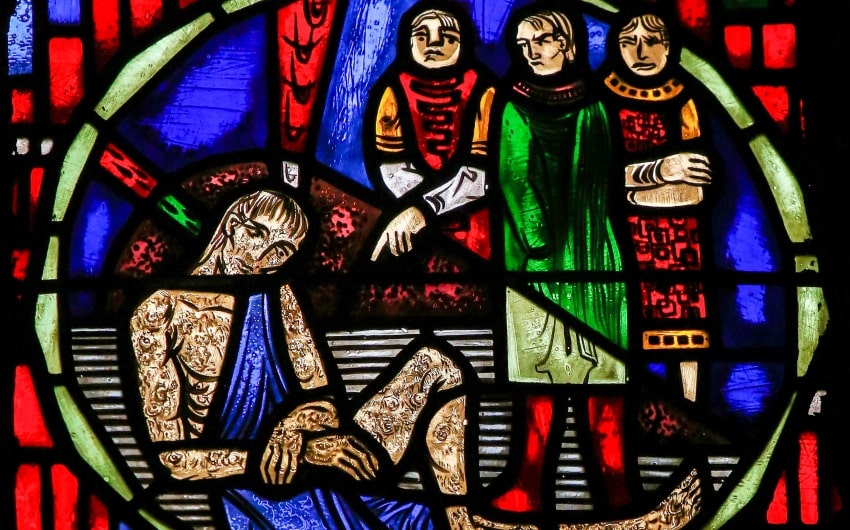What Happened to Job in the Bible? Explore His Journey
The story of Job is one of the most profound and thought-provoking tales in the Bible. It explores themes of faith, suffering, and divine justice that resonate deeply with many people. If you’ve ever wondered what happened to Job in the Bible, you’re not alone.
Job’s incredible journey through immense suffering and his unwavering faith in God provides timeless lessons and inspiration. In this article, we’ll delve into Job’s life, his trials, and his ultimate restoration, uncovering the powerful messages that continue to impact readers today.
Who Was Job?

Background Information about Job
Job is introduced in the Bible as a man of great integrity and faith, living in the land of Uz. He is described as “blameless” and “upright,” a person who “feared God and shunned evil” (Job 1:1). Job’s story is found in the Old Testament in the Book of Job, which is part of the wisdom literature. The historical and geographical details of Job’s life are sparse, adding to the timeless and universal nature of his story.
Job’s Character and His Life Before the Trials
Before his trials began, Job was blessed with immense wealth and a large, loving family. His character is depicted as exceptionally righteous and devout. He consistently acted as a moral and spiritual leader in his community, offering sacrifices and prayers for his children regularly, ensuring their spiritual well-being.
His Wealth, Family, and Status in Society
Job was one of the wealthiest men in his region, possessing vast numbers of livestock, including seven thousand sheep, three thousand camels, five hundred yoke of oxen, and five hundred donkeys, along with a large number of servants (Job 1:3). He had ten children—seven sons and three daughters—who enjoyed a close-knit relationship, often feasting together in each other’s homes.
Job’s prosperity extended beyond material wealth. He was highly respected and esteemed in his community for his wisdom, generosity, and compassion. People sought his counsel, and his opinions were valued. Job’s status and reputation were built on his unwavering faith and ethical conduct, making his subsequent trials even more poignant.
In summary, Job was a paragon of virtue and prosperity before his trials began. His exemplary life set the stage for the dramatic and testing events that followed, providing a stark contrast to the suffering he would endure and highlighting the depth of his faith and resilience.
The Test of Faith
The Heavenly Conversation Between God and Satan
The story of Job’s trials begins with a unique and intriguing scene set in the heavens. God praises Job’s righteousness to Satan, describing Job as “blameless and upright, a man who fears God and shuns evil” (Job 1:8). Satan, the adversary, challenges God’s assessment, suggesting that Job’s faithfulness is due to the blessings and protection God has given him. Satan argues that if Job’s blessings were taken away, his faith would falter, and he would curse God. This sets the stage for the profound test of faith that follows.
Satan’s Challenge to Job’s Faith and God’s Permission to Test Him
In response to Satan’s challenge, God allows Satan to test Job, but with specific limitations. Initially, Satan is permitted to take away Job’s possessions and children but is not allowed to harm Job physically. This agreement underscores the central theme of the story: the testing of Job’s faith under extreme conditions.
Initial Trials: Loss of Property, Livestock, and Children
Satan begins his assault on Job’s life with a series of devastating calamities. In rapid succession, Job receives news that all his livestock have been stolen or destroyed and that his servants have been killed by raiders and natural disasters. Finally, the most crushing blow comes when he learns that all his children have died in a tragic accident—a great wind collapsed the house where they were feasting (Job 1:13-19). These losses occur almost simultaneously, leaving Job in a state of utter desolation.
Despite the immense grief and shock, Job’s response is one of profound faith and submission. He tears his robe, shaves his head, and falls to the ground in worship, saying, “Naked I came from my mother’s womb, and naked I will depart. The Lord gave and the Lord has taken away; may the name of the Lord be praised” (Job 1:21). Job’s reaction to his immense loss is a testament to his unwavering faith in God, even in the face of unimaginable suffering.
Satan’s Second Challenge and God’s Permission
After Job endures the loss of his wealth and children without faltering in his faith, Satan presents a new challenge to God. Satan asserts that Job’s steadfastness will break if his own body is afflicted with pain, suggesting that people will do anything to save their own lives. In response, God permits Satan to afflict Job physically, but again with a limitation: Satan is not allowed to take Job’s life (Job 2:4-6). This sets the stage for Job’s intense physical suffering, adding another dimension to his trials.
Job’s Affliction with Painful Sores
Satan strikes Job with painful sores from the soles of his feet to the crown of his head (Job 2:7). These sores are described as loathsome and excruciating, covering his entire body and causing immense discomfort and pain. The physical agony Job experiences is compounded by the emotional and psychological toll of his previous losses.
In an effort to find some relief, Job takes a piece of broken pottery and scrapes himself while sitting among the ashes (Job 2:8). This image of Job, once a wealthy and respected man, now reduced to sitting in ashes and scraping his painful sores, is a powerful depiction of his profound suffering.
Job’s Physical and Emotional Agony
Job’s physical suffering is not limited to the pain from the sores. The affliction brings about a host of other symptoms and discomforts. He describes his skin as blackened and peeling, his bones burning with fever, and experiencing relentless pain day and night (Job 30:17, 30). His appearance becomes disfigured and frightening, further isolating him from those around him (Job 19:19-20).
The physical agony Job endures is compounded by the emotional and psychological anguish of his situation. He feels abandoned and despised, even by those who once respected and loved him. His friends, who come to comfort him, barely recognize him due to his altered appearance (Job 2:12). Job’s wife, overwhelmed by the sight of his suffering, urges him to curse God and die, to which Job responds with unwavering faith, saying, “Shall we accept good from God, and not trouble?” (Job 2:10).
The Impact of Isolation and Rejection
Job’s physical suffering leads to social isolation and rejection. He feels ostracized by his community and alienated from his friends and family. Job laments that even his closest friends have turned against him and that children mock him as he walks by (Job 19:13-19). This sense of isolation deepens his emotional pain, as he grapples with the loss of social connections and support.
The rejection Job faces is not just social but also spiritual. He feels abandoned by God, crying out in anguish for an explanation for his suffering. Job’s profound sense of isolation is captured in his lament: “Why do you hide your face and consider me your enemy?” (Job 13:24). His physical pain is intertwined with a deep spiritual and existential crisis, as he struggles to understand his plight.
Job’s Response to His Suffering
Throughout his physical suffering, Job’s response remains one of faith and endurance. He refuses to curse God despite his wife’s urging and continues to seek answers from God. Job’s lamentations and questioning reveal his deep desire for understanding and his struggle to reconcile his faith with his suffering.
Job’s perseverance through his physical agony demonstrates his profound faith and resilience. His ability to maintain his integrity and continue to seek a dialogue with God, even in the midst of intense suffering, underscores the central themes of faith, endurance, and divine justice in his story.
Job’s Friends and Their Counsel
Introduction of Eliphaz, Bildad, and Zophar
When Job’s friends—Eliphaz the Temanite, Bildad the Shuhite, and Zophar the Naamathite—hear of his suffering, they come to offer their support. Initially, they display genuine empathy by sitting with Job in silence for seven days and nights, recognizing the depth of his grief (Job 2:11-13).
The Friends’ Attempts to Explain Job’s Suffering
After this period of silence, Job’s friends begin to speak, attempting to explain the reasons behind his suffering. Each friend offers a different perspective rooted in the traditional belief that suffering is a result of sin:
Eliphaz suggests that Job’s suffering must be due to some wrongdoing and encourages Job to seek God’s forgiveness, implying that repentance will restore his fortunes (Job 4-5).
Bildad asserts that Job’s children must have sinned to deserve their fate and urges Job to repent to restore his own life, emphasizing the justice of God (Job 8).
Zophar is the most direct and harsh, accusing Job of concealing his sins and insisting that he needs to purify himself to be free of his afflictions (Job 11).
Their Arguments and Job’s Responses
Job’s friends maintain that his suffering is a punishment for sin, adhering to a retributive justice framework. However, Job vehemently disagrees, maintaining his innocence and insisting that his suffering is undeserved. He argues that their simplistic explanations do not account for the complexity of his situation and continues to demand an audience with God to understand the true reason for his suffering (Job 6-7, 9-10, 12-14).
The Role of Elihu in the Discussion
A younger observer, Elihu, intervenes later in the dialogue (Job 32-37). He criticizes both Job and his friends—Job for questioning God’s justice and his friends for failing to provide a satisfactory explanation. Elihu suggests that suffering can also serve as a divine discipline and a means of spiritual growth, offering a slightly different perspective on the nature of Job’s trials.
Job’s Lament and Questioning of God

Job’s Deep Lament and Questioning of His Suffering
As Job endures his profound suffering, he engages in a series of lamentations that reveal the depth of his despair and confusion. He curses the day of his birth, wishing he had never been born to experience such agony (Job 3:1-3). Job’s lament is a powerful expression of his emotional and physical torment, and it sets the tone for his subsequent questioning of God.
Job’s speeches are marked by a profound sense of injustice and bewilderment. He struggles to understand why someone who has lived a righteous life should suffer so intensely. He repeatedly expresses his longing for death as a release from his suffering, indicating the severity of his pain (Job 3:20-22). This lamentation serves as a raw and honest portrayal of human suffering, capturing the intensity of Job’s emotional and psychological state.
His Pleas for an Audience with God
In his quest for answers, Job desires a direct confrontation with God. He yearns for an explanation for his undeserved suffering and seeks to present his case before the Almighty. Job repeatedly calls for an opportunity to speak directly with God, to plead his innocence, and to understand the reasons behind his afflictions (Job 13:3, 13:22-24). This plea is driven by Job’s deep faith and his belief in divine justice, despite his current plight.
Job’s insistence on a direct dialogue with God highlights his need for a personal and satisfactory explanation. He believes that if he could just speak with God, he would be vindicated and his suffering would be justified. Job’s yearning for an audience with God underscores his profound faith and his unwavering belief in the fairness of divine judgment, even when it seems elusive.
The Theological and Philosophical Questions Raised by Job
Job’s lamentations and questioning raise significant theological and philosophical questions about the nature of suffering, the justice of God, and the human condition. His speeches explore the complexities of divine justice, challenging the traditional belief that suffering is always a result of sin. Job’s insistence on his innocence and his demand for an explanation highlight the disconnect between human understanding of justice and the reality of divine providence.
Job’s questioning delves into the mysteries of God’s ways, probing the reasons behind the suffering of the innocent and the prosperity of the wicked. He challenges the simplistic retributive justice espoused by his friends, arguing that the world is far more complex and that God’s ways are beyond human comprehension (Job 21:7-34). Job’s questions reflect a deep struggle with theodicy—the vindication of divine goodness and justice in the face of the existence of evil.
Throughout his lamentations, Job grapples with his faith, expressing both doubt and unwavering trust in God. He oscillates between despair and hope, questioning God’s justice while also expressing confidence that his Redeemer lives and that he will ultimately see God and receive an answer (Job 19:25-27). This duality in Job’s speeches highlights the tension between human suffering and divine faith, capturing the essence of his spiritual and emotional journey.
God’s Response to Job and Job’s Restoration
God’s Appearance in the Whirlwind
After a long period of silence, during which Job passionately defends his innocence and questions God’s justice, God finally responds. God’s appearance is dramatic and awe-inspiring, manifesting in a whirlwind (Job 38:1). This powerful entrance signifies the beginning of a profound and humbling dialogue, where God addresses Job’s questions and assertions.
The Divine Speeches: Questions About Creation and God’s Power
God’s response to Job comes in the form of a series of questions that highlight the vast difference between divine and human understanding. God challenges Job’s knowledge and understanding of the universe, asking rhetorical questions about the creation of the earth, the control of the seas, the origin of light and darkness, and the mysteries of the animal kingdom (Job 38-39). These questions are designed to underscore Job’s limited perspective and to remind him of the immense power and wisdom of God.
By posing these questions, God does not provide a direct explanation for Job’s suffering. Instead, the divine speeches serve to demonstrate that the complexities of the universe and the workings of divine justice are beyond human comprehension. This response shifts the focus from the reasons for Job’s suffering to the nature of God’s sovereignty and the limitations of human understanding.
Job’s Realization of God’s Majesty and His Own Limitations
In response to God’s speeches, Job experiences a profound revelation. He realizes the vastness of God’s wisdom and the insignificance of his own understanding. Job acknowledges that he has spoken of things he did not fully understand and expresses deep humility and repentance (Job 42:1-6). Job’s famous declaration, “I know that you can do all things; no purpose of yours can be thwarted” (Job 42:2), reflects his newfound awareness of God’s omnipotence and his own limitations.
Job’s realization leads him to a place of humility and submission. He retracts his previous statements and questions, recognizing that his perspective was limited and that he had overstepped in questioning the divine order. This moment of repentance is pivotal, as it marks the culmination of Job’s spiritual journey and his acceptance of God’s incomprehensible wisdom.
God’s Rebuke of Job’s Friends
After addressing Job, God turns his attention to Job’s friends—Eliphaz, Bildad, and Zophar. God rebukes them for not speaking the truth about Him as Job had (Job 42:7). Despite their intentions to defend God’s justice, their simplistic explanations and accusations against Job were misguided. God instructs them to offer sacrifices and to have Job pray for them, indicating that Job’s intercession is necessary for their forgiveness (Job 42:8-9).
This rebuke underscores the importance of speaking rightly about God and acknowledges Job’s integrity and faithfulness throughout his trials. The friends’ need for Job’s intercession also highlights the restoration of Job’s spiritual authority and his role as a mediator.
Job’s Repentance and Intercession for His Friends
Job’s prayer for his friends signifies his forgiveness and his willingness to intercede on their behalf, despite the pain their accusations caused him. This act of intercession is a testament to Job’s character and his restoration to a position of spiritual leadership. God accepts Job’s prayer, and his friends are forgiven, demonstrating the power of repentance, forgiveness, and reconciliation.
The Restoration of Job’s Fortunes: Double Blessings, New Family, and Long Life
Following Job’s repentance and intercession, God restores Job’s fortunes, blessing him with even greater wealth than before. Job receives double the amount of his previous possessions, including fourteen thousand sheep, six thousand camels, one thousand yoke of oxen, and one thousand donkeys (Job 42:10-12). This doubling of his wealth symbolizes not only material restoration but also divine favor and blessing.
In addition to his material blessings, Job is blessed with a new family. He has seven more sons and three more daughters, who are noted for their exceptional beauty (Job 42:13-15). Job’s daughters are given an inheritance alongside their brothers, which was unusual for the time and indicates the completeness of Job’s restoration and God’s favor.
Job’s life is extended, allowing him to live another 140 years. He witnesses four generations of his descendants, living a full and prosperous life (Job 42:16-17). This long life and the ability to see his lineage thrive serve as a testament to God’s blessings and the fulfillment of Job’s restoration.
The Legacy of Job’s Story
The story of Job has left a lasting legacy, influencing religious thought, literature, philosophy, and modern interpretations. Its themes of suffering, faith, and divine justice continue to resonate deeply across various cultures and eras.
Influence on Religious Thought
Job’s story is pivotal in Christianity, Judaism, and Islam, each tradition drawing profound lessons from his endurance and faith. In Christianity, Job is a symbol of patience and faithfulness amidst suffering, often referenced in discussions of theodicy. In Judaism, the story invites deep reflection on the nature of suffering and divine justice, with scholars exploring its complexities in rabbinic literature. In Islam, Job (Ayyub) is revered for his unwavering patience, serving as a model for enduring hardship with steadfast faith.
Impact on Literature and Philosophy
Job’s trials have inspired numerous literary works and philosophical inquiries. Writers like John Milton and William Blake have drawn on Job’s narrative to explore themes of suffering and redemption. Philosophers such as Søren Kierkegaard have engaged with Job’s existential questions, examining the nature of faith and human suffering. Job’s story challenges simplistic notions of justice and invites a deeper exploration of life’s complexities.
Modern Interpretations and Relevance
In contemporary times, Job’s story remains relevant in various contexts. Psychologists use Job’s emotional journey to understand coping mechanisms in the face of trauma. His narrative is also a cultural touchstone for discussing social justice and the resilience of marginalized groups. Many individuals find personal inspiration in Job’s unwavering faith and eventual restoration, viewing his story as a testament to the power of resilience and hope.







